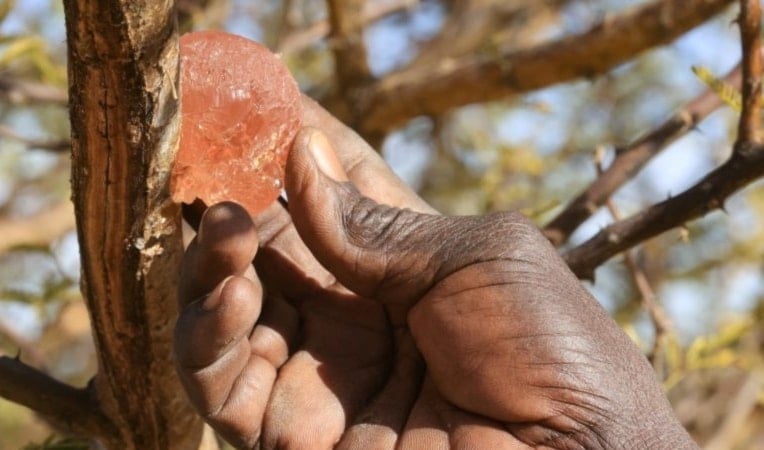Sudan gum arabic trade disrupted as conflict creates smuggling rings
In light of the war, Sudan's gum arabic trade has plummeted as the RSF takes over the harvest fields, forcing producers to resort to smuggling.
-

A Sudanese man shows gum arabic sap on the branch of an acacia tree, in the state-owned Demokaya research forest some 30km east of El-Obeid, the capital city of the central Sudanese state of North Kordofan, on January 9, 2023. (AFP)
Gum arabic, a vital ingredient in a range of global products from Coca-Cola to M&M's and L’Oreal lipsticks, is increasingly being trafficked from conflict zones in Sudan, severely disrupting the global supply chain.
Sudan, which produces approximately 80% of the world’s gum arabic, has been a dominant supplier for decades due to its vast acacia groves.
However, the ongoing war between Sudan’s national army and the paramilitary Rapid Support Forces (RSF) has led to the latter seizing control of key gum-harvesting regions, including Kordofan and Darfur, causing significant upheaval in the industry, with traders now forced to pay protection fees to the RSF to access the gum, leading to a sharp rise in smuggling operations.
Gum arabic, which plays a critical role in stabilizing and thickening ingredients in products such as food, cosmetics, and pharmaceuticals, is increasingly being exported through informal border markets.
These shipments are bypassing the necessary certifications that ensure the gum is ethically sourced, raising alarms for major global companies. Countries with little to no gum arabic production, including Chad, Senegal, and Egypt, are now emerging as key hubs for this illicit trade.
In some cases, gum arabic is being offered at discounted prices without any proof that it is conflict-free, leading to concerns that the supply chains of global ingredients makers could be infiltrated with smuggled products.
No authority, no order
Herve Canevet, a global marketing specialist at Eco-Agri, a Singapore-based supplier of specialty food ingredients, explained that the lack of regulation in Sudan has made it difficult to trace the origin of the gum. "Today, the gum in Sudan, I would say all of it is smuggled, because there's no real authority in the country," Canevet said.
The lack of proper documentation and certification from these smuggled sources has raised concerns among global companies. Major players in the industry, including Nexira, Alland & Robert, and Ingredion, who rely on certified and legitimate suppliers, are scrambling to ensure the legitimacy of their supply chains.
Companies such as Ingredion and Nexira have already taken proactive measures to mitigate the impact of the conflict, diversifying their sourcing from Sudan to other countries like Cameroon, where gum arabic is also produced.
As the situation in Sudan continues to evolve, industry leaders are calling for increased transparency and monitoring of the gum arabic trade, stressing the importance of ethical sourcing and the need for certification systems to prevent smuggled goods from infiltrating global markets.
Meanwhile, the RSF continues to control key production areas, further complicating efforts to stabilize the industry and ensure a reliable, conflict-free supply of gum arabic to the world.
RSF, allies, sign charter to form parallel government
RSF signed a charter with their allies on February 23 to form a parallel government, disregarding warnings that such a decision would divide the war-torn country.
The charter, which was signed behind closed doors in the Kenyan capital Nairobi, is said to lead towards a "government of peace and unity" according to signatories including the Rapid Support Forces, the United Civil Forces, professional unions, and People's Liberation Movement-North (SPLM-N).
AFP said that that charter calls for "a secular, democratic, decentralized state based on freedom, equality, and justice, without bias toward any cultural, ethnic, religious, or regional identity", adding an outline for a "new, unified, professional, national army" with a new military doctrine that "reflects the diversity and plurality characterizing the Sudanese state".
The proposed government is set to address service gaps in RSF territories according to Alaa El-Din Nuqd, who emphasized that "Citizens in these regions have been cut off from essential services like the new banknotes issued by the army, passport processing, and document renewals," as quoted by AFP.
Spokesperson for the United Civil Forces Najm al-Din Drisa said that the new administration could be formed within a month.

 4 Min Read
4 Min Read








